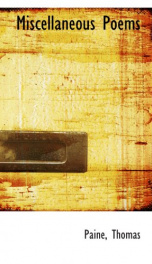Paine Thomas
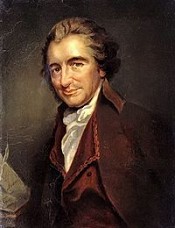
Thomas Paine (February 9, 1737 [O.S. January 29, 1736[1]] – June 8, 1809) was an author, pamphleteer, radical, inventor, intellectual, revolutionary, and one of the Founding Fathers of the United States.[2][3] Born in England, Paine emigrated to the British American colonies in 1774 in time to participate in the American Revolution. His principal contributions were the powerful, widely-read pamphlet Common Sense (1776), advocating colonial America's independence from the Kingdom of Great Britain, and The American Crisis (1776–1783), a pro-revolutionary pamphlet series. Later, Paine greatly influenced the French Revolution. He wrote the Rights of Man (1791), a guide to Enlightenment ideas. Despite not speaking French, he was elected to the French National Convention in 1792. The Girondists regarded him as an ally, so, the Montagnards, especially Robespierre, regarded him as an enemy. In December of 1793, he was arrested and imprisoned in Paris, then released in 1794. He became notorious because of The Age of Reason (1793–94), his book advocating deism, promoting reason and freethinking, and arguing against institutionalized religion and Christian doctrines.[3] He also wrote the pamphlet Agrarian Justice (1795), discussing the origins of property, and introduced the concept of a guaranteed minimum income. Paine remained in France during the early Napoleonic era, but condemned Napoleon's dictatorship, calling him "the completest charlatan that ever existed".[4] In 1802, at President Jefferson's invitation, he returned to America where he died in 1809. Only six people attended his funeral as he had been ostracized for his criticisms and ridicule of Christianity.[5] Paine was born February 9, 1737 [O.S. January 29, 1736[1]], the son of Joseph Pain, or Paine, a Quaker, and Frances Pain(e) (née Cocke), an Anglican, in Thetford, an important market town and coach stage-post, in rural Norfolk, England.[6] Born Thomas Pain, despite claims that he changed his family name upon his emigration to America in 1774,[7] he was using Paine in 1769, whilst still in Lewes, Sussex.[8] He attended Thetford Grammar School (1744-1749), at a time when there was no compulsory education.[9] At age thirteen, he was apprenticed to his stay-maker father; in late adolescence, he enlisted and briefly served as a privateer,[10] before returning to Britain in 1759. There, he became a master stay-maker, establishing a shop in Sandwich, Kent. On September 27, 1759, Thomas Paine married Mary Lambert. His business collapsed soon after. Mary became pregnant, and, after they moved to Margate, she went into early labour, in which she and their child died. In July 1761, Paine returned to Thetford to work as a supernumerary officer. In December 1762, he became an excise officer in Grantham, Lincolnshire; in August 1764, he was transferred to Alford, at a salary of £50 per annum. On August 27, 1765, he was fired as an Excise Officer for "claiming to have inspected goods he did not inspect." On July 31, 1766, he requested his reinstatement from the Board of Excise, which they granted the next day, upon vacancy. While awaiting that, he worked as a stay maker in Diss, Norfolk, and later as a servant (per the records, for a Mr. Noble, of Goodman's Fields, and for a Mr. Gardiner, at Kensington). He also applied to become an ordained minister of the Church of England and, per some accounts, he preached in Moorfields.[11] In 1767, he was appointed to a position in Grampound, Cornwall; subsequently, he asked to leave this post to await a vacancy, thus, he became a schoolteacher in London. On February 19, 1768, he was appointed to Lewes, East Sussex, living above the fifteenth-century Bull House, the tobacco shop of Samuel Ollive and Esther Ollive. There, Paine first became involved in civic matters, when Samuel Ollive introduced him to the Society of Twelve, a local, élite intellectual group that met semestrally, to discuss town politics. He also was in the influential Vestry church group that collected taxes and tithes to distribute among the poor. On March 26, 1771, at age 34, he married Elizabeth Ollive, his landlord's daughter. From 1772 to 1773, Paine joined excise officers asking Parliament for better pay and working conditions, publishing, in summer of 1772, The Case of the Officers of Excise, a twenty-one-page article, and his first political work, spending the London winter distributing the 4,000 copies printed to the Parliament and others. In spring of 1774, he was fired from the excise service for being absent from his post without permission; his tobacco shop failed, too. On April 14, to avoid debtor's prison, he sold his household possessions to pay debts. On June 4, he formally separated from wife Elizabeth and moved to London, where, in September, a friend introduced him to Benjamin Franklin, who suggested emigration to British colonial America, and gave him a letter of recommendation. In October, Thomas Paine emigrated from Great Britain to the American colonies, arriving in Philadelphia on November 30, 1774. He barely survived the transatlantic voyage, because the ship's water supplies were bad, and typhoid fever had killed five passengers. On arriving to Philadelphia, he was too sick to debark. Benjamin Franklin's physician, there to welcome Paine to America, had him carried off ship; Paine took six weeks to recover his health. He became a citizen of Pennsylvania "by taking the oath of allegiance at a very early period."[12] In January, 1775, he became editor of the Pennsylvania Magazine, a position he conducted with considerable ability. Moreover, Thomas Paine was an inventor and civil engineer. He designed the Sunderland Bridge over the Wear River at Wearmouth, England. It was patterned after the model he made for the Schuylkill River Bridge at Philadelphia in 1787, and the Sunderland arch became the prototype for many subsequent voussoir arches made in iron and steel.[13][14] He also received a British patent for a single-span iron bridge, developed a smoke-less candle,[15][16] and worked with inventor John Fitch in developing steam engines. Thomas Paine has a claim to the title The Father of the American Revolution because of Common Sense, the pro-independence monograph pamphlet he anonymously published on January 10, 1776; signed "Written by an Englishman", the pamphlet became an immediate success.[17], it quickly spread among the literate, and, in three months, 100,000 copies sold throughout the American British colonies (with only two million free inhabitants), making it a best-selling work in eighteenth-century America.[18] Paine's original title for the pamphlet was Plain Truth; Paine's friend, pro-independence advocate Benjamin Rush, suggested Common Sense instead. Paine was not expressing original ideas in Common Sense, but rather employing rhetoric as a means to arouse resentment of the Crown. To achieve these ends, he pioneered a style of political writing suited to the democratic society he envisioned, with Common Sense serving as a primary example. Part of Paine's work was to render complex ideas intelligible to average readers of the day, with clear, concise writing unlike the formal, learned style favored by many of Paine's contemporaries.[19] Common Sense was immensely popular, but how many people were converted to the cause of independence by the pamphlet is unknown.[20] Paine's arguments were rarely cited in public calls for independence, which suggests that Common Sense may have had a more limited impact on the public's thinking about independence than is sometimes believed.[21] The pamphlet probably had little direct influence on the Continental Congress's decision to issue a Declaration of Independence, since that body was more concerned with how declaring independence would affect the war effort.[22] Paine's great contribution was in initiating a public debate about independence, which had previously been rather muted. Loyalists vigorously attacked Common Sense; one attack, titled Plain Truth (1776), by Marylander James Chalmers, said Paine was a political quack[23] and warned that without monarchy, the government would "degenerate into democracy".[20] Even some American revolutionaries objected to Common Sense; late in life John Adams called it a "crapulous mass." Adams disagreed with the type of radical democracy promoted by Paine, and published Thoughts on Government in 1776 to advocate a more conservative approach to republicanism. In the early months of the war Paine published The Crisis pamphlet series, to inspire the colonists in their resistance to the British army. To inspire the enlisted men, General George Washington had The American Crisis read aloud to them.[24] The first Crisis pamphlet begins: In 1777, Paine became secretary of the Congressional Committee on Foreign Affairs. The following year, he alluded to continuing secret negotiation with France in his pamphlets; the resultant scandal and Paine's conflict with Robert Morris eventually led to Paine's expulsion from the Committee in 1779. However, in 1781, he accompanied John Laurens on his mission to France. Eventually, after much pleading from Paine, New York State recognised his political services with an estate, at New Rochelle, and money from Pennsylvania and from the Congress, at Washington's suggestion. In the Revolutionary War, he served as an aide to General Nathanael Greene. His later years established him as "a missionary of world revolution." Funding the American Revolution with Henry and John Laurens: According to Daniel Wheeler's "Life and Writings of Thomas Paine," Volume 1 (of 10, Vincent & Parke, 1908) p. 26-27: Thomas Paine accompanied Col. John Laurens to France and is credited with initiating the mission. It landed in France in March 1781 and returned to America in August with 2.5 livres in silver, as part of a "present" of 6 million and a loan of 10 million. The meetings with the French king were most likely conducted in the company and under the influence of Benjamin Franklin. Upon return to the United States with this highly welcomed cargo, Thomas Paine and probably Col. Laurens, "positively objected" that General Washington should propose that Congress remunerate him for his services, for fear of setting "a bad precedent and an improper mode."
do you like this author?
What readers are saying
What do you think? Write your own comment on this book!
write a commentWhat readers are saying
What do you think? Write your own comment on this author!
write a commentBook list

The Writings Of Thomas Paine,Volume III.1791-1804
Series:
Unknown
Year:
Unknown
Raiting:
4/5
Show more
add to favoritesadd In favorites

The Writings Of Thomas Paine,CompleteWith Index to Volumes I - IV
Series:
Unknown
Year:
Unknown
Raiting:
5/5
Show more
add to favoritesadd In favorites

the complete religious and theological works of thomas paine
Series:
Unknown
Year:
Unknown
Raiting:
5/5
Many of the earliest books, particularly those dating back to the 1900s and before, are now extremely scarce and increasingly expensive. We are republishing these classic works in affordable, high quality, modern editions, using the original text and artwork.
Show more
add to favoritesadd In favorites
Book list

The Writings Of Thomas Paine,Volume III.1791-1804
Series:
Unknown
Year:
Unknown
Raiting:
4/5
Show more
add to favoritesadd In favorites

The Writings Of Thomas Paine,CompleteWith Index to Volumes I - IV
Series:
Unknown
Year:
Unknown
Raiting:
5/5
Show more
add to favoritesadd In favorites

the complete religious and theological works of thomas paine
Series:
Unknown
Year:
Unknown
Raiting:
5/5
Many of the earliest books, particularly those dating back to the 1900s and before, are now extremely scarce and increasingly expensive. We are republishing these classic works in affordable, high quality, modern editions, using the original text and artwork.
Show more
add to favoritesadd In favorites

rights of man being an answer to mr burkes attack on the french revolution
Series:
Unknown
Year:
Unknown
Raiting:
4.5/5
Show more
add to favoritesadd In favorites
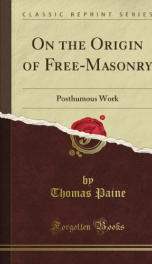
on the origin of free masonry posthumous work
Series:
Unknown
Year:
Unknown
Raiting:
5/5
ON THEORIGINFREE-MASONRY.Jt is always understood that Free-Masons have a secret Avhich they carefully conceal; but from every thing* that can be collected from their own accounts of Masonry their real secret is no other than their origin, which but few of them understand; and those who do, envelope it in mystery.The society of Masons are distinguished into three classes or degrees. 1st, the Entered Apprentice. 2d, the Fellow Craft.' 3d, the Master-Mason.About the Publisher Forgotten Books is a publisher of historical writings, such as: Philosophy, Classics, Science, Religion, History, Folklore and Mythology.Forgotten Books' Classic Reprint Series utilizes the latest technology to regenerate facsimiles of historically important writings. Careful attention has been made to accurately preserve the original format of each page whilst digitally enhancing the difficult to read text. Read books online for free at www.forgottenbooks.org
Show more
add to favoritesadd In favorites

letter addressed to the abb raynal on the affairs of north america
Series:
Unknown
Year:
Unknown
Raiting:
5/5
Show more
add to favoritesadd In favorites

examination of the passages in the new testament quoted from the old and calle
Series:
Unknown
Year:
Unknown
Raiting:
5/5
Show more
add to favoritesadd In favorites

complete works of thomas paine containing all his political and theological wr
Series:
Unknown
Year:
Unknown
Raiting:
5/5
Show more
add to favoritesadd In favorites
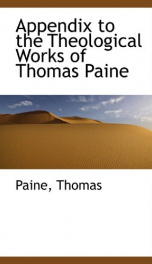
appendix to the theological works of thomas paine
Series:
Unknown
Year:
Unknown
Raiting:
4/5
Show more
add to favoritesadd In favorites

age of reason being an investigation of true and fabulous theology
Series:
Unknown
Year:
Unknown
Raiting:
5/5
Show more
add to favoritesadd In favorites
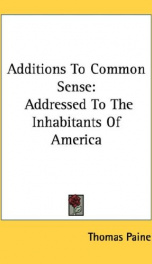
additions to common sense addressed to the inhabitants of america
Series:
Unknown
Year:
Unknown
Raiting:
4/5
Show more
add to favoritesadd In favorites

a letter to the earl of shelburne now marquis of lansdowne on his speech july
Series:
Unknown
Year:
Unknown
Raiting:
5/5
Show more
add to favoritesadd In favorites

Writings of Thomas Paine — Volume 4 (1794-1796): the Age of Reason
Series:
Unknown
Year:
Unknown
Raiting:
3/5
Show more
add to favoritesadd In favorites

Writings of Thomas Paine — Volume 2 (1779-1792): the Rights of Man
Series:
Unknown
Year:
Unknown
Raiting:
4.5/5
Show more
add to favoritesadd In favorites

Writings of Thomas Paine — Volume 1 (1774-1779): the American Crisis
Series:
Unknown
Year:
Unknown
Raiting:
2.5/5
Show more
add to favoritesadd In favorites
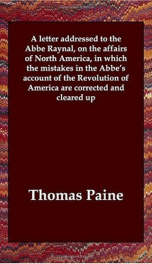
A Letter Addressed to the Abbe Raynal, on the Affairs of North America, in Which the Mistakes in the Abbe's Account of the Revolution of America Are Corrected and Cleared Up
Series:
Unknown
Year:
Unknown
Raiting:
4.5/5
This book was converted from its physical edition to the digital format by a community of volunteers. You may find it for free on the web. Purchase of the Kindle edition includes wireless delivery. --This text refers to the Kindle Edition edition.
Show more
add to favoritesadd In favorites
What readers are saying
What do you think? Write your own comment on this author!
write a commentif you like Paine Thomas try:
readers also enjoyed
What readers are saying
What do you think? Write your own comment on this author!
write a commentGenre
if you like Paine Thomas try:
readers also enjoyed
Do you want to exchange books? It’s EASY!
Get registered and find other users who want to give their favourite books to good hands!
